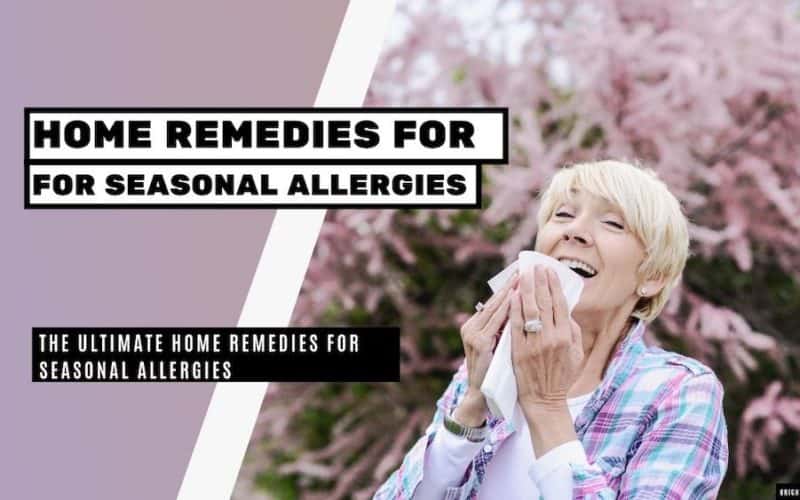Spring is around the corner again; you see the flowers and colors bloom, and you already know what’s coming; allergies. In this case, home remedies for seasonal allergies can prove your best allies against spring allergens, and have an additional benefit! So, here we will discuss the ultimate home remedies for seasonal allergies.
Table of Contents
What Causing Allergic Reactions
An allergic reaction occurs when our body’s immune system reacts to something that doesn’t bother other people. Some of the biggest offenders for causing allergic reactions are:
- Pollen
- Food
- Insect stings
- Pet dander
- Dust mites
- Mold spores
- And medications
Every allergic person knows the sleepiness that comes along antihistamines. But with natural remedies for allergies, you can say goodbye to both your allergies and the side-effect of pills! Sounds good? Keep reading and find the right natural relief for your itchy eyes and nose!
Home Remedies for Seasonal Allergies
1. Nasal flushing, upgraded
Yes, we know you’ve probably tried this home remedy for seasonal allergies several times in your life, but still hate the sensation. We all do!
But, while it may be pretty uncomfortable for a few minutes, evidence points out that it actually works, as it flushes all the rests of allergens in our nostrils.
The first thing to know about the effectiveness of this method is that you must do it regularly, as bothersome as it is. If you do it, you’ll see how it actually works better than you thought. But if that’s not enough for you to try, we have an additional upgrade for this natural remedy for allergies.
Instead of using the regular saline solution – which still works – you can buy a xylitol solution in your favorite naturist store, and use it for a gentler rinse.
With a more potent effect, that awkward flushing sensation may start to be truly worth it! Give it a try and let us know how it goes!
2. Apple cider vinegar, the holy grail of natural remedies
If you’re into natural remedies for other illnesses besides allergies, you’ve probably seen this one a lot! Apple cider vinegar is like aloe vera; it’s beneficial for almost anything that happens to our body, and hay fever is no exception!
By cleaning your lymphatic system, and preventing the mucous production, apple cider vinegar is a strong ally in combating your allergies symptoms.
Unlike saline solution, you don’t need to rinse it through your nose for it to work. You can just drink a daily teaspoon or even better, use it as dressing, and it will be both helpful for your nose and delicious for your food!
Is apple cider vinegar as miraculous as they say? Find out the real benefits of apple cider vinegar.
3. Aromatherapy for soothing and relief
According to the ayurvedic specialist Balinda Macri, health coach at the holistic health company Vital Plan, certain essential oils scents help decongest the mucous membrane.
The combination of specific scents can also provide a soothing sensation that relaxes the body, relieving stress, and reducing the inflammation on your nose passages.
According to a study published cited by Macri, in Evidence-Based Complementary and Alternative Medicine, this natural remedy for allergies showed significant improvement in the group that used it for 7 days, compared to the control group.
Recommendations for this therapy are variable, but among the most used essential oils for decongesting your nose, you can find:
- Eucalyptus
- Basil
- Sandalwood
- Geranium
- Ravensara
- Lavender
- Peppermint
You can both perceive the oils by diffusing them or acquiring therapeutic nasal oils and adding a small portion to the insides of your nose.
4. Bee pollen homemade vaccine
Have you ever heard about vaccines coming from the virus itself? Well, this home remedy for seasonal allergies kind of follows this principle.
As you already know, seasonal allergies are a reaction to specific allergens in our environment; some of the most common are pollen, grass, dust, etc.
Bee pollen includes particles from all these allergens. This is particularly true when locally produced, as it will contain the allergens from the same environment that are causing your hay-fever.
According to an interview made by Well And Good magazine to the certified allergist Heather Moday, bee-pollen works as a homemade vaccine to progressively convince your body that these substances are not so dangerous.
She admits that it may work for some, and others may not find so much of a result. But for those ones suffering mild symptoms of pollen and other seasonal allergies, this may be a top of the knot remedy!
Moday makes it clear that this natural remedy for allergies must be part of your lifestyle to work. But she does insist on it being an effective alternative to long-term antihistaminics.
Some people argue that consuming local raw honey may have the same effect. But, in this question answered by the American College of Asthma and Allergies, you can see why you should avoid it if you suffer from seasonal allergies:
5. Acupuncture
This may be a remedy that not everyone is willing to try. But, acupuncture is scientifically proven to be efficient for treating all kinds of allergies, including seasonal.
While we couldn’t call it home-therapy, it certainly is a natural remedy for allergies, as the therapy inflects the immune system directly, through vital energy points.
If fear of needles makes you reluctant to try this treatment, this systematic review of 13 studies proving it, may help you decide:
6. Herbal remedies for seasonal allergies
You’ve probably been asking yourself when we would get to the herbs, and you’re right to ask so because herbs are one of the options that can’t fail. From ancient times, smelling the vapor of certain wild herbs has helped in the treatment of all kinds of respiratory issues.
We DO NOT encourage you to trust these remedies for treating severe breathing conditions or disease. But some of these herbs prove to be genuinely potent for seasonal allergies. While we’ll list the recommended herbs and some of their benefits, you can find reliable and verified studies on them too.
-
Bromelain:
Found in fruits like pineapple or papaya, it’s an enzyme that reduces the mucus production.
-
Butterbur:
Anciently used in Asian traditional medicine for treating asthma and allergies. Studies have proven that the Petatewalide B component on this plant is actually potent on the reduction of inflammatory cells that cause allergies.
However, consuming the raw plant can be toxic to humans, which is why we recommend you go to a specialist if you’re thinking of using this remedy.
-
Nettle leaf:
If you’re a tea lover, then this allergy remedy is right what you were waiting for from an article called home remedies for seasonal allergies.
This plant, when consumed in teas or infusions, prevents the production of histamine, and therefore, offers a natural relief to allergies. To boost its effects, mix it with other herbs like peppermint.
-
Spirulina
Acting as a preventive treatment, the blue-green algae, spirulina, is proven by a study to protect the system against allergic rhinitis.
-
Peppermint and eucalyptus
Previously mentioned in this article. These two herbs create a protective barrier against allergies, by mixing antimicrobial and anti-inflammatory properties. They’re the most common ingredients on vapor-rubs.
Other Options for Relieving Seasonal Allergies
So, yes, all these natural remedies for allergies are proven to be effective in treating your seasonal hay fever. However, you must understand that attending your allergies is not enough; you need to assume some habits to improve your condition.
Modern lifestyle imprints many deficiencies in our immune system already. If you don’t actively work to keep allergies at bay, the effects will increase considerably.
Here you have some options to the home remedies for seasonal allergies that may prevent you from needing treatment in the first place.
1. Change the way you Eat
Food is a notable factor of allergies due to two reasons: many foods cause allergies, and many have components that combat allergies.
In this sense, the answer seems obvious; stop eating those that cause allergies and start eating those that fight it.
Even so, knowing your food allergies is not as easy as it sounds. You may have to take an allergy test to find out which ones are causing you the reaction (peanuts are a common allergy trigger as well as seafood).
On the other hand, changing your feeding habits will 100% surely help you prevent allergies, just like the natural remedies for allergies we’ve seen above. But, what should you include on our diet? Here’s the list:
- Probiotics: Probiotics balance the immune system, preventing it from reacting too aggressively in front of harmless substances, which is what happens during an allergic reaction. Find a guide on introducing probiotics to your diet here.
- Omega 3: These fatty acids, usually found in certain fishes, krill, or flaxseeds, among others, have two beneficial effects for allergies. The first one is that they boost the immune system, and the second is the reduction of inflammatory processes in the body. Plus, a 2015 study proved that it also reduces the severity of allergic reactions and asthma.
- Quercetin: Found in onions, broccoli, and some berries, this antioxidant helps control the histamine production, reducing the allergic reaction.
- Vitamins C y D: Increasing the consumption of these vitamins, whether it’s through food or supplements, helps improve the effect of antihistamines. Even so, it’s not proven that their effect work on preventing allergies if not combined with medicine.
- Beta-glucan: This component commonly found in oats boosts the immune reaction, and reduces allergy symptoms.
- Spices: Spices like ginger, pepper, cinnamon, and especially turmeric, have potent effects on clearing the nasal passages and reducing symptoms.
- Avoiding wine and beer during the allergy season: Both these beverages contain histamines such as sulfites that increase the allergic reactions.
Including these foods in your diet regularly, and avoiding the ones that trigger your allergies, are an excellent preventive strategy against allergy reactions.
But changing your diet is not the only new-habit you must implement for fighting hay-fever.
2. Exercising and Reducing Stress
Whatever the disease or condition you have, stress will always make it worst, why? Because the constant exposition to high-stress levels collapses the immune system. The same, of course, happens with allergies.
Exercising is an excellent way to relieve stress and keep the breathing system at its best. You may say it’s the most natural home remedy for seasonal allergies, as you only need to move to take it!
Also, some specific exercises like yoga chest-opening positions help to keep the airways clear, says Macri, the ayurvedic specialist we cited before. If you’re not into yoga, just keep your body active and be sure to train your upper body to strengthen the breathing organs.
If, on the contrary, you do enjoy yoga, then you can try these 3 yoga poses for seasonal allergy relief.
Another yoga practice that will help you with allergies through stress relief is meditation. As we know, meditation may prove hard for those who never tried it, so, here you can find beginners guide to meditation.
3. Hygiene Habits
This is probably one of the hardest habits to change because you surely don’t think you’re unhygienic. The thing is that allergy hygiene goes beyond regularly acceptable hygiene practices, and there you may be failing without noticing, as getting away from allergens is not easy.
Some things you may pay attention to, or apply to bulletproof your environment against allergens are:
- Take off your clothes and shoes the moment you arrive home: Allergens from the outside can get stuck in your shoes and clothes, and then you’d be spreading them all over the house.
- Vacuum regularly: Pollen, dust, and other allergen particles are hard to remove and may still stay in the air and hard corners even after cleaning. Using the vacuum at least once a week prevents particles from cumulating in your house.
- Keep pets clean and out of the bedroom: Pet dander is one of the top allergens. Regular baths may help to reduce the accumulation of these danders in your pet. But, at least during allergy season, you shouldn’t be sleeping with them.
- Humidifiers and air conditioners: Keeping your air clean is part of allergic preventive hygiene. These devices reduce the humidity in the air and prevent allergic particles like mold that are highly allergic.
All these life changes may seem too much effort when listed like that, but we assure you when you see the effects on your allergies, you’ll find them worth it enough.
Now you’re ready to face spring with the proper vibe and a bulletproof respiratory system! Introduce these small changes in your life, take your favorite home remedy for seasonal allergies, and Vivre la vie en rose!





